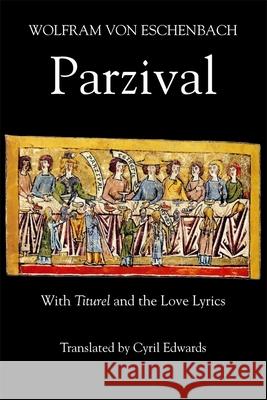Parzival: With Titurel and the Love Lyrics » książka
Parzival: With Titurel and the Love Lyrics
ISBN-13: 9781843840053 / Angielski / Twarda / 2002 / 368 str.
Vast in its scope, incomparably dense in its imagery, Wolfram von Eschenbach's Parzival ranks alongside Dante's Divine Comedy as one of the foremost narrative works to emerge from medieval Europe. This book is a new translation of Parzival, together with the fragments of the Titurel, an elegiac offshoot of Parzival, and the nine love-songs attributed to Wolfram. Parzival is the greatest of the medieval Grail romances. In its depth and complexity of characterisation this work of the early thirteenth century anticipates the modern novel. It encompasses deeds of chivalry, tournaments and sieges, courtly love, and other erotic undertakings, but also sin and penance, and a deeply moving study in depression. Centre stage are the Grail Castle and Arthur's Round Table, but the pagan world of the Orient also is also reflected. Parzival has inspired and influenced works as diverse as Wagner's Parsifal and Lohengrin, Franz Kafka's The Castle, Terry Gilliam's film The Fisher King, and Umberto Eco's Baudolino. Cyril Edwards' thoughtful translation vividly conveys the power of this complex, wide-ranging medieval masterpiece. CYRIL EDWARDS is a lecturer in German at St Peter's College and Research Fellow of the Faculty of Medieval and Modern Languages, University of Oxford. He is the author of The Beginnings of German Literature (Camden House, 2002), and numerous articles on the medieval lyric and Old High German. His previous translations include Hans Sachs's -Song of the Nose- for the King's Singers, Bernhard Maier's Dictionary of Celtic Religion and Culture (Boydell & Brewer, 1997) and The Medieval Housebook (Prestel-Verlag, 1997).











